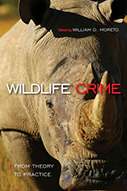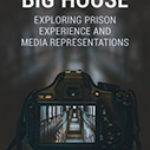Wildlife Crime: From Theory To Practice

Editor: William D. Moreto
Publisher: Philadelphia: Temple University Press, 2018. 330p.
Reviewer: Monique C. Sosnowski | March 2019
William Moreto brings together two-dozen pioneering minds in wildlife crime for a multifaceted exploration of the field. An emerging focus of criminology, wildlife crime has considerable impacts on wild populations, local economies, and national security. By compiling the essays of both scholars and practitioners, Moreto has demonstrated the role criminologists play in the study of wildlife crime, and more importantly, in its prevention.
Wildlife Crime: From Theory to Practice is unique in its offering of theoretical, methodological, and practitioner perspectives, whereas its predecessors have offered primarily theoretical approaches. The diverse voices within this work offer expertise on a wide range of wildlife crimes, spanning illegal, unreported, and unregulated (IUU) fishing, the illegal ivory and rhino horn trades, and investigations of the illegal caviar and Barbary macaque trades, to name just a few. Distinctive to this volume is also its contributors’ varied perspectives – namely green, conservation, and environmental criminology – which are succinctly united using an array of wildlife crimes in the first section of the book.
Wildlife Crime’s methodological focus narrows in on the wide range of approaches to empirical wildlife crime research. This section provides an assortment of research methods from area experts, including an overview of field methods for readers who may be curious but overall unfamiliar with the field, and in-depth coverage for those looking for inspiration for their own work. The methods detailed include conducting international interviews, gathering participant observations, conducting multi-site research, and encountering dangerous situations as part of studying illegal trading, among others.
Lastly, the book features the voices of its field practitioners, rarely found in most approaches to wildlife crime. Moreto successfully bridges the gap between two often-distant worlds with his insightful invitation of practitioners to the third section of the volume. In this final section, the reader hears from a security analyst working to implement anti-poaching strategies, discovers the transdisciplinary nature of wildlife crime prevention, and gets a first look at a comprehensive global study on ranger well-being.
Wildlife Crime: From Theory to Practice successfully demonstrates how criminology can significantly contribute to global efforts to end illegal wildlife trade. This collection of essays takes a global approach, citing projects from Peru to Madagascar to Russia, and contributes to the ever-growing literature on wildlife crime. It is a digestible read for those just dipping their toes into criminology or wildlife crime, and is a must-read for emerging scholars and academics in the field.
Monique Sosnowski, Criminal Justice Doctoral Student, John Jay College of Criminal Justice


